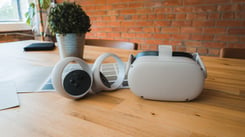The IT department: idolized cyber warriors when a laptop won’t connect or a server crashes in the middle of a tight deadline, yet also the dismissive border control, unable to authorize access to any shiny new piece of technology until it’s been given the tech equivalent of a sweat-inducing strip search. The last thing you want is for your VR integration to be held up in border patrol. Rigorously maintaining network security and reliability as well as ensuring systems are scalable at the drop of a hat keeps those in IT up at night. Any new technology being introduced to a company’s mix, therefore, has a far better chance of navigating its way around a skeptical gatekeeper if these considerations have been well thought out beforehand. So you want smoothe VR integration into your organization? Of course, you do. Need to know how to approach the IT team and make this a quick and easy conversation? No problem. We’re a technology company and we’ve thought this through - a lot. Let’s break down the key VR integration concerns and let you know how to address them.
Security

Typically IT’s top issue is security. Find out if and how a vendor partner has to integrate with your systems. Yulio is a cloud-based platform meaning users can access the technology wherever and whenever they are by logging into their account at Yulio.com. There is no deep integration with a company network and, unless users choose to download a Yulio plugin for any of the CAD tools they already use (SketchUp, Revit, etc), no Yulio code resides on any network but our own. IT will want to understand if your proposed VR solution works with the tools you use and they are supporting today, or if you are trying to replace your tools Yulio's physical infrastructure is hosted and managed within Amazon’s secure data centers and utilizes the Amazon Web Service (AWS) technology. Amazon continually manages risk and undergoes recurring assessments to ensure compliance with industry standards. Another key element of security is the reliability of any storage - if you’re putting your intellectual property in the cloud, it needs to be there when you have to access it. So what happens to your stored designs? Are they durable? On Yulio, yes, but only for 10,000,000 years. Yulio uses Amazon's S3 storage, which is designed to provide 99.999999999% durability of objects over a given year. 99.999999999% durability corresponds to an average annual expected loss of 0.000000001% of objects. This means, if you store 10,000 objects with Amazon S3, you can, on average, expect to incur a loss of a single object once every 10,000,000 years.
Reliability

There’s nothing quite as sobering as the fear-laced sweat that comes with standing in a room full of people poised to give a demonstration, only for a piece of essential software to fail. This embarrassment doesn’t deflect to the software provider, it makes the presenter look unprepared and unreliable. This is the stuff of IT department nightmares and a diligent team will, therefore, carry out an interrogation in advance so they don’t get a panicked call requesting a fix for faulty technology they can’t control if it fails in a critical moment. You’ll want to be able to speak to some key elements of reliability - What are the downtime commitments? Is there any offline backup? Do you need internet connectivity to present? Are there redundancies built into the system? Is there a disaster recovery plan? As examples of the kind of information you’ll want a partner to share, let me run down Yulio’s features. Yulio’s provider allows for recovering databases to within seconds of the last known state, restoring system instances from standard templates, and deploying applications and data.
- Yulio's databases are automatically backed up on secure, access controlled, and redundant storage.
-
- While the collaborate feature requires internet connectivity to facilitate possibly hundreds of users viewing a design in real-time, Yulio does have an offline component meaning, VR experiences can be downloaded and stored for access when no internet connection is available.
- Yulio’s platform maintains high levels of redundancy to prevent any single points of failure.
Yulio's platform is designed for stability, scaling, and inherently mitigates common issues that lead to outages while maintaining recovery capabilities. In the case of an outage, the platform is deployed across multiple data centers using current system images and data is restored from backups.
Scalability

Although a great piece of software can seem comparable to magic, the truth is that every single element has, at some point, been considered in order to make it function every time, and in an exact way, users need it to. Scalability refers to when and where you will need to use your VR solution - does it work where you are, and where your clients are? How many viewers can it handle? Software that works brilliantly in any of these scenarios demonstrates choices the company has made about infrastructure along the way. Yulio’s platform is designed for global businesses, its cloud-based infrastructure was therefore built specifically to ensure it is able to perform at any scale, in any international territory. One of our biggest scalability tests happened in December 2016, when our Chief Product Officer was presenting Yulio at Siggraph Asia in Macau, China. While showing a Yulio VR experience, the pairing code to join a collaborative session was on screen. As he continued his talk, more than a hundred audience members joined, and a scalability trial by fire was passed both in International locales, and simultaneous user numbers. We like to believe that even if your IT department resembles a stone-faced border guard, Yulio has carefully considered the elements that would cause them concern and built a system with seamless integration in mind. Consider the key elements of security, reliability, and scalability before talking with IT learn a little extra respect...and maybe a higher spot on the IT queue.
Ensuring that the VR integration of Yulio is as highly secure, reliable and scalable is part of our mission to make VR a practical business easily adopted by architects, designers, and retailers. Need to know more about the questions to ask a potential VR partner, in all areas of your workflow? Check out our FREE 5-day email course on full workflow integration.






